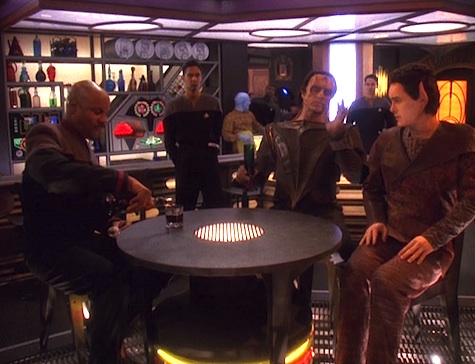“TIES OF BLOOD AND WATER”
Bringing new meaning to that old expression, “What’s your poison?”
I found this episode stronger than I remember, although it’s not without its flaws. “Second Skin” was a third season highlight and I’m glad we got some follow-up given that it remains one of Kira’s defining moments. Unfortunately, things begin on something of a bum note with the relationship between Kira and Ghemor seeming particularly forced. Now, I guess it is wholly possible that Kira and Ghemor bonded through that traumatic incident, but we really didn’t see much indication of that in “Second Skin” other than Kira coming to realise that Ghemor was actually a good, respectable man who genuinely cared for his daughter.
I can accept that they kept in touch and maintained a friendship of sorts, although both the writers and actors do go into overkill trying to sell their “father-daughter” bond. It just felt a little unnatural to me and when the writers are clearly trying to manipulate the viewer’s emotions by cheating (ie., “yes, we got very close—and it happened off screen so you’ll just have to take our word for it!”) it lessens my emotional connection to what’s happening. Yup, that’s probably what stopped this from being
quite the emotional powerhouse it’s aiming to be. The first quarter or so of the episode has an awkward, sluggish, calculated kind of feel and although Nana Visitor delivers a truly superb performance as the episode progresses, I felt she was overdoing things in the early scenes because Kira was behaving FAR too...giddily, which is just not in character.
However, once the episode gets going, my initial misgivings fell away because there’s a lot to enjoy here. The notion of a Cardassian deathbed ritual of dishing dirt on one’s political rivals is so deliciously...Cardassian! Given this element, I was expecting the episode to become a political thriller with all kinds of twists and turns relating to Dukat and the Dominion. Alas, we don’t really learn a single interesting thing from Ghemor. In fact, the confession plot is basically a McGuffin and doesn’t really amount to anything. The real thrust of the story is altogether more personal as the interwoven flashbacks to Kira’s father’s death soon demonstrate.
This is where the episode excels. It’s a story about facing death and what happens when, out of fear or an inability to deal with the pain, we choose not to face it. This very often happens in life; a current event will trigger a past pain and issues we’ve long tried to bury or suppress will come flooding to the surface. Alas, the only way to deal with them is to finally confront and work through them. Or turn to drink or drugs, I guess. During the Occupation, Kira was living in hell and didn’t have the luxury of time or space to process her traumas and grief. It made sense that she’d inadvertently compartmentalised her suffering and that at a later time would eventually have to deal with it.
The flashbacks are effective (although I’ve never been crazy on the Occupation-era wig they give Visitor) and it’s a nice touch to see William Lucking reprise his role as the ill-fated, and in this timeframe, two-armed Furel. Of course, Dukat’s involvement elevates the episode substantially and his gleeful visit to Kira’s quarters where he shares some incriminating information about Ghemor’s past is the highlight of the episode.
This is the Dukat Marc Alaimo was born to play, and Visitor is equally marvellous. It’s an absolutely electrifying scene, beautifully performed and expertly staged. Who can forget the shocking moment when Kira suddenly throws a cup at his face?
The rest of the episode is a triumph. Ghemor’s deathbed scenes are well handled and uncomfortably realistic. Kira’s dilemma makes for compelling drama and her eventual realisation that can’t leave Ghemor to die alone—as she did her real father—is a poignant one. Visitor sells the
hell out of it, particularly in the monologue she delivers in the Infirmary afterward. The camera just hangs on her face in a scene that feels intimate and raw. Avery Brooks’ directing throughout is pretty much flawless; in my book, he’s definitely the most talented actor-turned-director since Jonathan Frakes.
Another huge bonus is the return of the scene-stealing Jeffrey Combs as another incarnation of Weyoun. Combs is hilarious throughout, and the poisoned kanar scene in Quark’s is quite probably among the show’s top ten moments (“Oh, my, that really is quite toxic!”). Dukat and Weyoun immediately establish themselves as an incredibly entertaining double act and it’s great to get some follow-up to the world-shattering events of “By Inferno’s Light”.
I think that about covers it. Despite a few reservations early on and some heavy-handed setup, this becomes a poignant and insightful character drama and an important part of Kira’s arc and journey toward healing and wholeness. Add some Cardassian and Dominion intrigue to the mix, and Nana Visitor at the top of her game, and you have a clear winner.
Rating: 8




